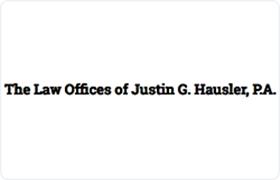Paisley Criminal Lawyer, Florida
Sponsored Law Firm
-
 x
x

Click For More Info:
-
The Law Offices of Justin G. Hausler, P.A.
5570 South US Highway 17-92 Casselberry, FL 32707» view mapCriminal Defense Because Your Case Matters
As a Former Prosecutor, Justin G. Hausler has a wealth of jury trial experience and offers representation regarding all misdemeanor and felony charges.
407-617-1064
Jade Brianna Downing
Criminal, Federal Trial Practice, Other
Status: In Good Standing Licensed: 3 Years
Jennifer Laura Ware
Business, Commercial Real Estate, Administrative Law, Juvenile Law
Status: In Good Standing Licensed: 11 Years
 Justin Hausler Casselberry, FL
Justin Hausler Casselberry, FL AboutThe Law Offices of Justin G. Hausler, P.A.
AboutThe Law Offices of Justin G. Hausler, P.A. Practice AreasExpertise
Practice AreasExpertise
